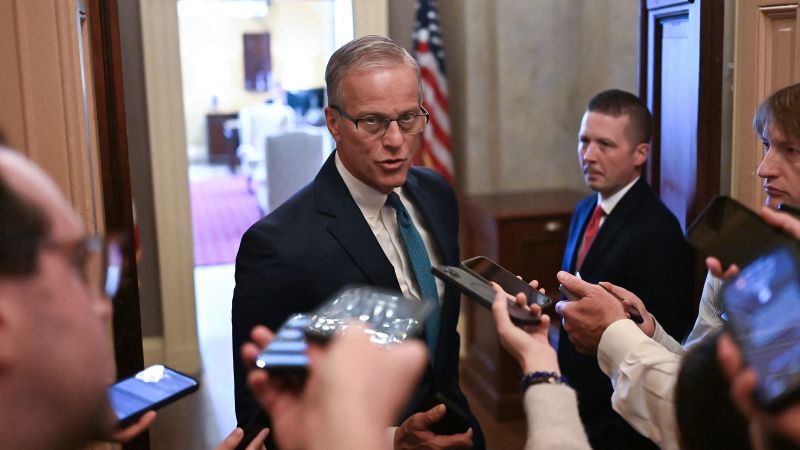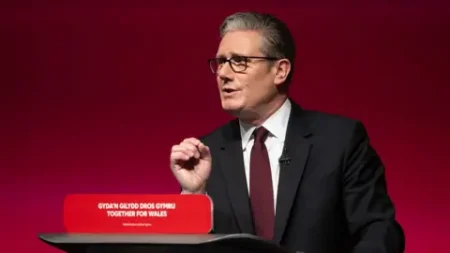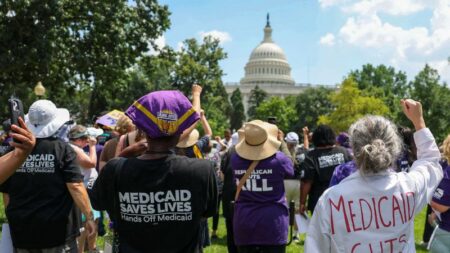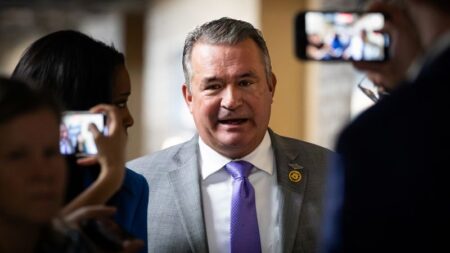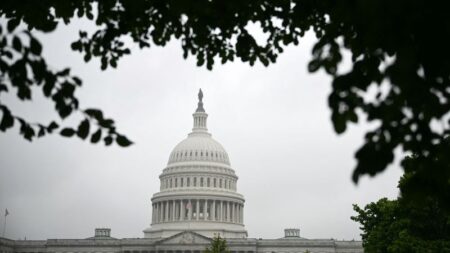President Donald Trump is facing intense challenges as he attempts to push his extensive legislative agenda through the Senate. As the weekend approaches, GOP leaders are gearing up for a crucial vote, but as of Friday night, they still lack the necessary support to ensure the package passes. This precarious situation has many on edge, particularly with key Republican Senators expressing their uncertainty and reservations about the proposed measures.
Hours preceding the expected vote, Senate Majority Leader John Thune informed Republican senators of the imminent first vote. This announcement was met with caution by Sen. Thom Tillis of North Carolina, a pivotal figure whose forthcoming reelection may hinge on how this bill impacts his constituents. Tillis has vocalized serious concerns regarding the bill’s implications, particularly relating to cuts in Medicaid, which are used to finance Trump’s tax cuts and broader spending reductions. His insistence that his vote hinges on substantial transformations in the proposed legislation adds another layer of difficulty for GOP leadership.
Should Tillis decide to oppose the package, it would signify a significant setback for Senate GOP leaders. It is crucial for them to maintain majority support, as they can only afford three defections within their ranks to advance the legislation. The clock is ticking, with July 4 Independence Day being a targeted deadline for Trump’s agenda, which Senate leaders have been racing to finalize. Any delay in passing the agenda could embolden critics and spark calls for more changes, complicating the GOP’s already fragile coalition.
In addition to Tillis, Senator Rand Paul has already announced his intention to vote against the bill, primarily due to concerns surrounding a proposed $5 trillion increase in the debt limit. Other influential GOP figures, such as Senators Josh Hawley, Lisa Murkowski, Jerry Moran, and Susan Collins, have also raised their voices against the bill’s Medicaid cuts. Despite their expressed willingness to work with leadership to soften the impact of the proposed cuts, their votes remain uncertain.
Restoring Medicaid funding to please these senators may not guarantee the necessary votes, as it could alienate more fiscally conservative members of the party. Senators Ron Johnson and Mike Lee have both criticized the legislation, accusing it of worsening the budget deficit. As they and others consider voting as a bloc against the measure, the stakes become higher for Senate leaders.
If the first procedural vote on Saturday is unsuccessful, GOP leaders may be forced to rework the bill significantly, which would further complicate Trump’s efforts. The timeline is critical, particularly as Democrats often seize opportunities to scrutinize GOP proposals, particularly those affecting safety net programs like Medicaid. The outcome of the vote could lead to a marathon session of amendments and debates known as “vote-a-rama,” where Democrats would have the chance to highlight vulnerabilities in the proposal.
Senate leaders aim for a quick passage of the bill, hoping that the House can promptly address it mid-week for Trump’s signature ahead of the holiday. However, a considerable obstacle remains: compliance with the Senate’s complex budget rules governed by the nonpartisan parliamentarian. Recent rulings have already struck down several provisions, including vital funding mechanisms for Medicaid, requiring GOP leaders to scale back their aspirations to avoid a Democratic filibuster.
Despite anxious murmurs among senators regarding the final text of the legislation, which has yet to be revealed, some GOP senators express confidence in their discussions about the bill. Nonetheless, individuals like Senators Johnson and Hawley could easily pivot if presented with provisions they find fundamentally problematic, particularly regarding Medicaid. They have emphasized that they need to see the bill’s details before making a decision on whether to support it.
Legislative leaders are working tirelessly to produce a finalized version of the bill, despite it feeling precariously close to the anticipated vote. The Finance Committee’s discussions on essential healthcare provisions are ongoing, and there is considerable concern in the Senate that without final text regarding Medicaid cuts, they cannot ideally prepare for that crucial vote. Some GOP senators have already downplayed the dilemma of working through legislative details at the last moment.
As this political drama unfolds, one thing remains certain: the intricacies of both the legislative landscape and the alliance among Republicans make the upcoming vote essential not only for Trump’s agenda but also for the party’s unity moving forward. This situation encapsulates the challenges Republicans face as they navigate their internal disagreements while trying to pass potentially transformative legislation.





